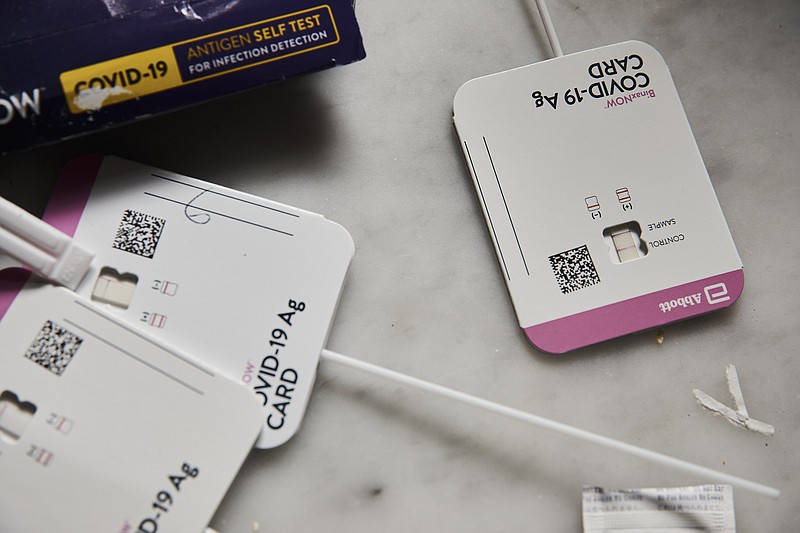WASHINGTON -- The Biden administration on Thursday restarted a program that provides free coronavirus tests to U.S. households through the Postal Service, part of a new push by the government to head off rises in virus cases and hospitalizations as winter approaches.
The program, which was paused in September after distributing more than 600 million tests, is resuming after federal officials dipped into what the White House said was "existing, limited funding." Households are now able to order four tests at covidtests.gov, with shipments beginning next week.
The tests are one component of a broader covid-19 "winter preparedness plan" the White House rolled out Thursday, reflecting mounting anxiety over a cold-weather surge in virus cases across the country. Cases have risen roughly 55% over the past two weeks, while deaths have surged by around 65% in the same period. Hospitalizations have risen more than 20%, adding strain to medical centers already deluged by cases of the flu and respiratory syncytial virus, or RSV.
Two omicron subvariants, BQ.1 and BQ.1.1, have largely driven the climb in coronavirus cases. They now make up around two-thirds of cases in the United States and can dodge prior immune defenses more easily than other recent variants.
Covid cases are up across 90% of the country, White House covid-19 coordinator Dr. Ashish Jha said Thursday during a briefing. Deaths and hospitalizations are also on the rise, with nearly 3,000 deaths reported last week. Most of those have been concentrated in people age 65 and older, Jha said.
"We don't want this winter to look like last winter or the winter before," Jha said. Jha also told reporters he is confident that the worst of RSV -- which hit young children particularly hard -- is over, but that flu cases are only just spiking.
The Biden administration has urged Americans to update their protection by getting one of the reformulated booster shots introduced in September, but the reaction to the new shots has been tepid. Only about 14% of Americans ages 5 and older have received an updated booster. Among those 65 and older, an age group that includes people who are particularly vulnerable to covid-19, barely one-third of people have received one of the new shots.
The administration is also urging states and local governments to do more to encourage people to get the updated bivalent covid-19 vaccines, which scientists say are more effective at protecting against serious illness and death from the currently circulating variants. The administration is reiterating best practices to nursing homes and long-term care facilities for virus prevention and treatment and is urging administrators as well as governments to encourage vulnerable populations to get the new shots. Less than half of all nursing home residents have received the latest booster shot, Jha said.
The at-home test program is reopening as lawmakers on Capitol Hill are working toward finalizing a spending package to keep the government funded through September. The Biden administration has asked for more than $9 billion in additional funding for the pandemic response, but Republicans have resisted calls for more covid-19 spending, arguing that the administration has demonstrated it can repurpose federal funds for virus-related needs.
The new round of at-home tests is being paid for with funds from the $1.9 trillion pandemic relief bill enacted last year, according to a senior administration official who briefed reporters Wednesday evening on the condition of anonymity. The renewal of the program risks agitating Republicans by suggesting that the federal government still has money it can draw on for the pandemic response, despite its pleas for more.
The Biden administration began offering free at-home tests through the Postal Service in January after demand for coronavirus testing skyrocketed with the arrival of the highly contagious omicron variant. President Joe Biden was sharply criticized for not moving earlier to secure tests for Americans, even as federal officials argued that they had acted aggressively in procuring them, including for schools and long-term care facilities.
The government continued operating the at-home test program as the year went on, allowing Americans to order additional rounds of tests. But the White House paused the program in September, citing a lack of funding.
The White House said the new tests would come from the national stockpile, which still has reserves even after the administration shut off the at-home testing program in September, citing a lack of money from Congress. The administration is still asking Congress for billions more dollars for the virus response.
The pause on free at-home testing program this summer allowed the administration to save some free at-home tests for the surge in cases this winter, Jha said.
Americans with health insurance and on Medicare can still secure eight at-home tests for free each month. As part of its announcement Thursday, the White House said it would distribute at-home tests to thousands of federally supported senior facilities and at hundreds of food banks.
Information for this article was contributed by Noah Weiland of The New York Times and by Zeke Miller and Amanda Seitz of The Associated Press.

